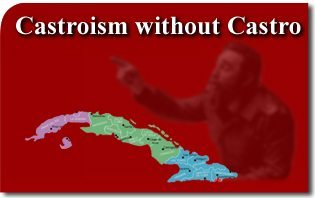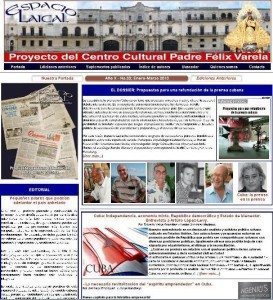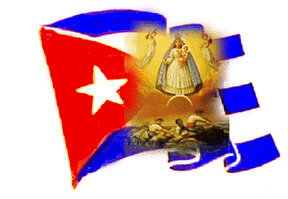
The Havana Archdiocesan Magazine Comes All Out in Defense of Castro
In its magazine Espacio Laical (No. 230, May 2013), the Archdiocese of Havana has come out stronger than ever in defense of the Cuban regime and its nefarious Communist “model” — even as the world listens in horror to the serious denunciations about the tragic plight of Cubans which manage to evade the blockade of silence imposed by the dictatorship.
The recent editorial in Espacio Laical coincides with a trip abroad by Cuban dissidents whom the communist regime has persecuted, gagged and humiliated for decades. The Havana Archdiocesan publication lambastes Cubans and foreigners who criticize the dictatorship by claiming they are “insisting” on asking “important power centers in the world” to “destabilize the Cuban government” by taking measures that could “primarily hurt the people of the island.”
As far as the Cuban opponents are concerned, in their recent travels to countries in the Americas and Europe they have merely described, in a clear and didactic fashion the situation of injustice, poverty and oppression which has oppressed 11 million Cubans for more than fifty years. Their audience includes the populations of the countries visited, as well as authorities and media leaders willing to listen. Yet, Espacio Laical claims that this peaceful action, by removing scales from people’s eyes and raising awareness in whole nations regarding the Cuban tragedy, would “hurt the people on the island.”

Screenshot of Espacio Laical’s website.
It’s amazing just how biased an archdiocesan publication can get. The truth is exactly the opposite of what it claims. Indeed, the denunciations by these Cuban dissidents are invaluable to make their jailers sense that the world is watching them and they can no longer get away with impunity. This can only help protect the enslaved Cubans, rather than hurt them. Espacio Laical could hardly show greater bias in its pro-Castro stance.
To make matters worse, the magazine issues a call for “chiseling this social model” i.e., the Communist model of society) to prevent “others” from “imposing a new model” and thus managing to “hijack” Cuba. As if Cubans and particularly Catholics had not been kidnapped and gagged by the Communist regime for more than five decades! These would have been objectionable words had they been published by the Communist newspaper, Granma. They are utterly unimaginable when you consider they were actually published in the official magazine of the Havana Archdiocese.
After attacking the regime’s opponents and defending the Communist “social model,” in its uncompromising pro-Castro stand, Espacio Laical goes so far as to justify state repression by euphemistically describing it as mere “inflexibility” on the part of the Castro regime. And it gives “to the Communist Party and government” this friendly piece of advice: avoid a “hypertrophied rigidity” that could “plunge the country into the abyss.”
What “abyss” is Espacio Laical seeking to avoid? The magazine explains that the catastrophe to be avoided is “what has happened in many countries in Eastern Europe”… In other words, the “abyss” the archdiocesan magazine fears is neither more nor less than the island’s liberation from the Communist yoke. It would be very naive to think that Cardinal Jaime Ortega y Alamino, the collaborationist Archbishop of Havana, was unaware of Espacio Laical’s disastrous editorial before its publication. The Archdiocese of Havana is actually throwing the regime a lifeline in face of its growing deterioration. And if the regime is shipwrecked, the Archdiocese will try as much as possible to save the remains of the egregious Cuban “social model” and to promote, directly or indirectly, a Castroism without Castro.
According to Espacio Laical, there is “every indication” that “Cubans in general” do not want “a change like the one that has occurred in many countries of Eastern Europe.” What data is Espacio Laical actually based on to make this incredible claim that Cubans do not yearn for a prompt and complete shipwreck of communism? It would be important to find out.

It is sad to note finally that the archdiocesan magazine editorial omits the slightest allusion to God, to the principles of the Catholic religion, and to supernatural life. In this sense, the aforementioned editorial is a tragic example of the spiritual destruction communism has wrought in Cuban Catholic circles over a half century of oppression.
In 1995, the Secretary of State of the Holy See was handed an historic petition to John Paul II signed by leading figures of the Cuban exile, titled “Cuban Exiles Appeal to John Paul II: Your Holiness, Protect Us from the Actions of Cardinal Ortega” (Diario Las Americas, Miami, October 24, 1995). That filial letter showed concern about the pro-Communist collaborationism of Cardinal Ortega and the Cuban bishops, and implored the Pope’s intercession to prevent ecclesiastical authorities from indulging in that collaborationist game. The letter also expressed the hope that those authorities would instead denounce to the world the plight of our enslaved brothers and make the Catholic faithful aware of the need for a crusade of prayer, sacrifice and strong denunciations to liberate the Cuban people from the clutches of the atheist regime. Now, 18 years later, as the pontificate of Francis I begins, that historic petition takes on an ever greater urgency.

Armando Valladares, writer, painter and poet, spent 22 years in Cuban prisons. He is the author of the bestseller “Against All Hope,” which recounts the horror of Castro’s prisons. He was U.S. ambassador to the UN Human Rights Commission under the Reagan and Bush administrations. He received the Presidential Citizen’s Medal and the Superior Award from the State Department. He has written numerous articles on ecclesiastical collaboration with Cuban communism and the Vatican Ostpolitik toward Cuba.

